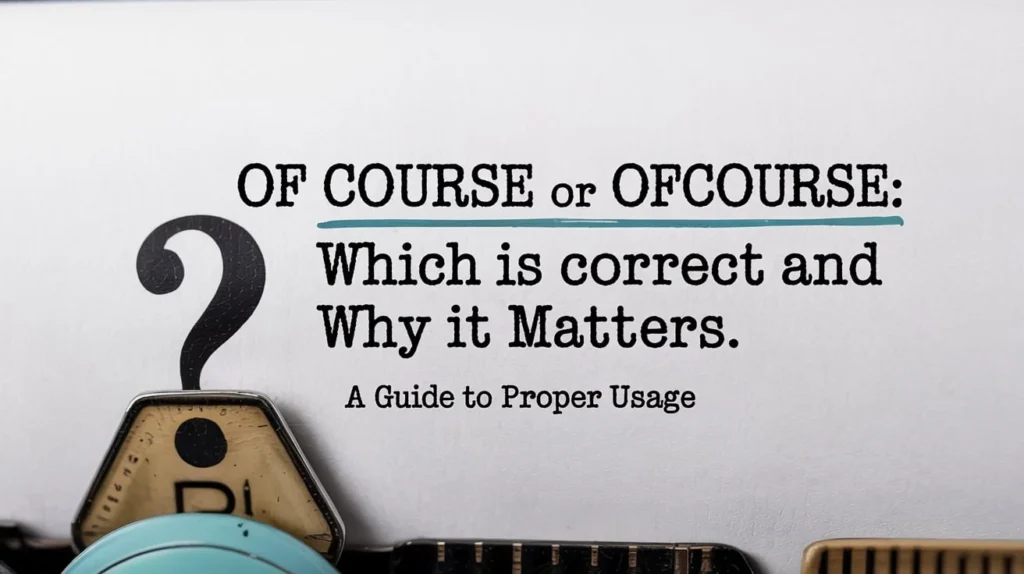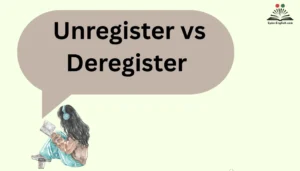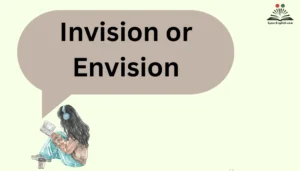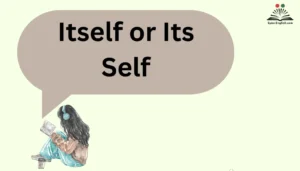Whether you’re writing a professional email, crafting a college essay, or just texting a friend, choosing the right words matters. One tiny space can be the difference between correct English and a simple spelling error. That’s exactly the case with the phrase “of course.”
You’ve probably seen both “of course” or “ofcourse” floating around online. Maybe you’ve even wondered which one is right—or if it even makes a difference. Spoiler alert: it does. And the confusion isn’t as silly as it might seem at first glance. English is full of phrases that sound like compound words but aren’t.
This article breaks down the confusion, explains the real meaning, gives plenty of examples, and even dives into a bit of history. We’ll also look at why so many people use “ofcourse” without realizing it’s incorrect, and how you can make sure you’re not one of them.
Let’s get into it and settle this once and for all.
Quick Answer: “Of Course” Is the Correct Form
Let’s cut straight to the point: “Of course” (two words) is the only grammatically correct version.
| Phrase | Correct? | Accepted in Formal Writing? | Found in Dictionaries? |
| Of course | ✅ Yes | ✅ Yes | ✅ Yes |
| Ofcourse | ❌ No | ❌ No | ❌ No |
“Ofcourse” is a common misspelling.- It’s not listed in reputable dictionaries like Merriam-Webster, Oxford English Dictionary, or Cambridge.
- Grammar check tools will flag it as incorrect.
If you’re writing anything that needs to sound polished or professional, stick with “of course.”
Why the Confusion Between ‘Of Course’ and ‘Ofcourse’?
The confusion stems from a few surprisingly relatable causes:
It Sounds Like One Word
When we speak, “of course” rolls off the tongue as if it’s a single unit. So naturally, some people write it that way.
We Merge Other Phrases
English often turns two-word phrases into compound words:
- “Into”
- “Everyday”
- “Sometime”
But not all phrases follow that rule. “Of course” isn’t one of them.
Texting & Typing Culture
In informal writing—like texts, tweets, or forum posts—people often type fast and don’t double-check spelling. Over time, this leads to widespread misuse.
Autocorrect Fails
Some autocorrect systems even allow “ofcourse” to pass without correction, especially in casual apps.
What Does “Of Course” Actually Mean?
“Of course” is an idiomatic expression that typically means yes, naturally, or as expected. But it can carry different tones depending on context.
Primary Meanings
- Agreement or Affirmation
“Can I borrow your pen?” — “Of course!” - Expectation or Obviousness
“Of course he forgot—he always does.” - Politeness or Courtesy
“Would you like some coffee?” — “Of course, thank you.”
Tone Matters
The tone can shift from sincere to sarcastic depending on how it’s used.
“Oh, of course you’re late again. Shocking.”
In this case, it drips with sarcasm. Always consider your tone when using this phrase in writing.
Is “Ofcourse” Ever Correct or Acceptable?
No. “Ofcourse” is not a real word.
- You won’t find it in Oxford, Collins, Merriam-Webster, or Cambridge.
- It’s not recognized in any official grammar or style guides.
- It may show up online, but that doesn’t make it correct.
Why You Might Still See It Online
People make mistakes, especially in casual digital spaces:
- Reddit comments
- TikTok captions
- Tweets
- Text messages
These platforms aren’t known for grammar policing, so incorrect spellings spread fast.
Synonyms and Alternative Phrases for “Of Course”
Sometimes, you want to say “of course” but with a slightly different tone or more formal flavor. Here are some great alternatives:
| Synonym | Tone | Example Sentence |
| Certainly | Formal / Polite | “Certainly, I’ll send the file today.” |
| Naturally | Neutral / Assumed | “Naturally, she brought dessert.” |
| Absolutely | Strong Agreement | “Absolutely! I agree 100%.” |
| Sure | Casual | “Sure, I can help you move.” |
| No problem | Informal / Friendly | “No problem, happy to help.” |
| By all means | Formal / Supportive | “By all means, use the conference room.” |
When and How to Use “Of Course” (With Examples)
Sentence Positioning
“Of course” can appear:
- At the beginning:
“Of course, I’ll join you for lunch.” - In the middle:
“He will, of course, want to check the data.” - At the end (less common):
“You can come too, of course.”
Formal vs Informal Use
- Formal: “Of course” is polite, respectful, and appropriate in emails, reports, and meetings.
- Informal: Still works in casual conversation, though tone matters.
Dos and Don’ts
✅ DO:
- Use it to politely confirm or agree.
- Use it when granting permission.
- Use it in writing when tone is clear.
❌ DON’T:
- Use it sarcastically in writing unless it’s clearly for humor.
- Merge it into “ofcourse.”
Real-World Examples of “Of Course” in Sentences
Friendly Affirmation
- “Of course I’ll help you study.”
- “Of course, come in and have a seat.”
Ironic or Sarcastic
- “Of course you lost your keys again.”
- “Of course he forgot my birthday.”
Formal Permission
- “You may use my office, of course.”
- “Of course, you’re welcome to attend the meeting.”
Dialogue Examples
Person A: “Do you mind if I borrow your charger?”
Person B: “Of course not. Go ahead!”
Origin and Etymology of “Of Course”
The phrase “of course” traces back to the late 14th century. It originally had a literal meaning related to movement or direction—“in the course (path) of events.”
Historical Development
- Derived from Old French cours and Latin cursus (meaning “running” or “course”).
- Over time, it evolved into an idiom implying natural progression or expected outcome.
- First used in English writings in the 1800s with the modern meaning.
Etymological Roots
| Word | Language of Origin | Meaning |
| Course | Latin (cursus) | A running, path |
| Of | Old English | Belonging to |
| Of Course | Middle English | As a matter of course |
Today, the phrase has shed its literal meaning and is used purely idiomatically.
Common Misspellings and Mistakes Similar to “Ofcourse”
You’re not alone if you’ve typed “ofcourse” without thinking. It happens! Here’s a list of other commonly mistaken compound words:
| Incorrect Form | Correct Form |
| Alot | A lot |
| Incase | In case |
| Everytime | Every time |
| Anyways | Anyway |
| Eachother | Each other |
Quick Tip to Avoid This Mistake
If you’re unsure whether two words should be merged, try this:
Look it up in a dictionary. If it’s not there, don’t use it.
Grammar Check: What Style Guides Say
All major style manuals agree—“of course” is correct.
Chicago Manual of Style: Use “of course” as two separate words in formal writing.
AP Stylebook: Avoid unnecessary compound forms.
Oxford English Grammar: No entry for “ofcourse”—considered a spelling mistake.
Grammarly: Flags “ofcourse” as incorrect 100% of the time.
This is not a case of British vs. American spelling. It’s incorrect everywhere.
Tools and Tips to Avoid Mistakes Like “Ofcourse”
Here’s how to make sure you’re not slipping in extra errors like this one:
Top Grammar Tools
- Grammarly: Auto-corrects and flags incorrect phrases.
- ProWritingAid: Offers style and readability checks.
- Hemingway Editor: Great for tone and structure feedback.
Proofreading Tips
- Read your text out loud—you’ll hear awkward or incorrect phrasing.
- Use the “Ctrl+F” method to scan for likely misspellings (like “ofcourse”).
- Trust your dictionary more than autocorrect.
FAQs About “Of Course”
Is “of course” rude?
It can be if used sarcastically or condescendingly. Use with care.
Can I use “of course” in essays or academic writing?
Yes, but only when the tone is appropriate. For strict formal tone, use “certainly” or “naturally.”
Is there a difference in UK vs. US usage?
Nope. Both use “of course” the same way.
Why do so many people type “ofcourse”?
Speed typing, autocorrect, and spoken language influence spelling habits.
Is “of course” okay in business emails?
Yes, especially when confirming or granting permission:
“Of course, I’ll attach the documents right away.”
Conclusion: Stick With “Of Course” and Be Confident
Language evolves, but correctness still matters—especially in writing.
“Of course” is not just the right form, it’s also versatile, polite, and universally accepted. Whether you’re confirming a meeting or agreeing to help a friend, this phrase fits the bill—as long as you spell it correctly.
So, next time you write “of course,” make sure there’s a space between the words. It’s a small detail, but it shows you care about clear, accurate communication.
Bonus: Quick Reference Chart
| Use Case | Example Sentence |
| Polite Agreement | “Of course, I’ll be there at 9.” |
| Giving Permission | “Of course you may leave early.” |
| Ironic/Sarcastic | “Of course you forgot your password.” |
| Friendly Affirmation | “Of course! Let’s do it.” |
Let me know if you’d like this published with internal links, a featured image, meta description, or schema markup to boost SEO even more!

Emma Brooke is a passionate English educator, writer, and language enthusiast with over a decade of experience helping learners master the nuances of the English language. At SynoEnglish, she blends practical grammar advice with real-world communication tips to make English easier, clearer, and more enjoyable for readers of all levels.



